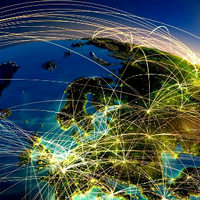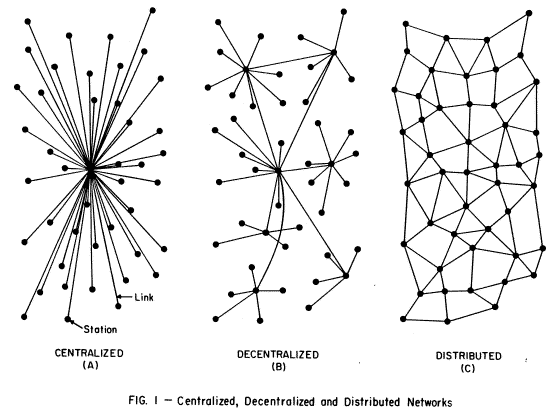Online Social Networks create an unprecedented opportunity for us to connect and share information and resources with each other. However, to date, social media corporations that we have allowed through our omissions to define and centralise our online social networking experience are creating costs to our freedom, privacy, relationships, community, and health. With greater awareness and an attitude of mindfulness, we can use new decentralised network models and shape our online experience for our authentic living and wellbeing.
How Social Media Fails Us
The invention of the internet to create the potential for a global-wide scale of interconnection has created a historic opportunity for increasing collective awareness and support.
The Internet itself is a decentralised network, and was purposely designed that way in order to survive a nuclear war. In other words, a decentralised network is the safest and most resilient model for networking. However, despite this foundation, social media corporations have created centralised online networks in their quest to dominate the Internet and acquire, own, and exploit user data for profit, such as targeted advertising.
By centralising their networks and controlling the experience of their users and the use and ownership of their personal data, a hierarchical relationship has emerged in which users are dominated in the following ways:
- Corporations have the sole authority to control all the data of their users, and often claim ownership of it.
- Personal data of users is kept in a centralised data centre owned by the corporation, rather than with users themselves.
- By keeping the personal data of users in the corporation’s own data centres, a global surveillance system of personal information is effectively created, which is now being actively used.
- Users have little control over how their personal information is disseminated or presented to their online friends.
- Often too much of a user’s activities is revealed.
- Privacy is eroded.
- Users have to agree to the policies of the social media corporation when using the social media platform, even though they may involve usage of their data for targeted advertising.
- Information in the form of posts is often demoted in its exposure unless users pay to increase exposure, defeating the purpose of social networking for users.
- Often personal data is never erased when a user tries to close their account.
- Personal information is presented to others based on the corporate design of the social media platform, rather than on the authentic needs of users.
- An homogenous culture is encouraged by creating a uniform social media experience and functionality for users.
- Through the global centralisation of its social network, a social media corporation can diminish the significance of individuals and their local communities.
There have been many cases now of social media corporations hitting the headlines for the unethical way they operate. Whether it is publishing news stories to friends’ news feeds about a user’s activities on external websites (the Beacon scandal), passing users’ personal data to the US National Security Agency, or experimenting on global populations by manipulating the emotional presentation of posts in news feeds (the “emotion contagion” experiment), it is clear that the control of a network by a profit-making corporation can not be trusted, and nor should it.
While many of the objections against centralised social networks are often about privacy, what is often overlooked is the fact that such networks, by the fact that they are centred in the corporation itself, fail individuals because the network is not centred in the locality of the individual and their local community. How can we meet our authentic needs or the needs of our local community when the social network that we are using is centred in, controlled, and generated for us by a global corporation? It is an elementary understanding that in order for a network to truly serve our needs, it should be centred in and have its roots in our immediate social environment: our own local community. When our social interactions lose their foundation in the intimacy of our local community, and shift towards an oversized and largely anonymous global network centred within a global corporation, local community inevitably becomes weaker.
The imposition of a global structure for social networking by social media corporations is of deep concern because the structure of our social networking only serves us when it reflects our authentic and local needs. This means that in order to support each other through social networking, we need to decide how we network, based on individual and local factors, which requires full control over the design and functionality of our social network. We also need to be able to evolve our networking behaviour as we evolve in our personal growth, which means, for example, creating the ability to network based on shared authentic needs and authentic values—none of which I have ever seen in existing social media personal profile categories.
At present, the leading social media networks—because they do not target our authentic needs and values very well, and work very well at propagating trivia and sensation with their focus on trivial mundane updates, photo memes, and entertainment videos—too often submerge useful information with banality, and serve as a means for us to dissociate into entertainment and distraction, which is why they become so addictive. The addiction to online social media, in contrast to using it as a tool to assist physical community building, is undermining real physical interaction in our local communities, and is causing our psychological health to decline as areas in the prefrontal cortex of our brain atrophy in response to our dissociation into virtual realities.
Because a true sense of community is not created by the centralised networks of social media corporations—for many of the reasons above—social media networks are often seen as places to compete for attention, and often encourage self-promotion to emerge at the expense of cooperation. The amount of “likes” and comments a post, photo, or video gets often becomes more important than decisions to put aside self-promotion and to work together with others in mutual support. Professional “connections” are often sought solely for the purpose of building a marketing base for self-promotion, rather than for working together.
Centralised and Decentralised Social Media Networks
The centralised approach to online social media networking is the model used by social media corporations because it serves primarily the corporation through the financial exploitation of global personal data which is stored on their data centre. This is why the leading social media corporations are some of the richest corporations on the planet.
In contrast, the decentralised approach to online social media is a model where a user’s personal data and the software running the social media platform is stored on a trusted server of the user’s choice, usually on a locally based or personally owned or rented server. This prevents the global concentration of user data in the hands of one corporation, and usually the software is open source, created by community volunteers in cooperation rather than by a corporation.
The decentralised model can also take the form of a distributed social network, or federated social network, which means that the same software is distributed to a decentralised network of servers that interact with each other as a federation to form one social network owned by the users themselves. Diaspora is currently a popular example of this.
Figure 1 below shows how these various models of networks are structured and how information and energy will flow. It starkly reveals just why a centralised social network concentrates power, and why it lacks the diversity, user control, and local responsiveness that is required for a social media network to serve the authentic needs and values of individuals and their local communities.
Of course, by their very nature of not being centralised in a corporation, decentralised and distributed social media networks do not have a high profile as they are non-profit and lack the billions of dollars of funding that centralised social media networks enjoy. The onus is on us to seek them out and to give them our support, rather than to drift along on automatic pilot in centralised social media networks that do not serve our authentic needs or honour our authentic values.
Online Social Media Networks and Authentic Living
A decentralised online social media network offers the best solution for individuals and their local communities to support each other in meeting shared authentic needs and honouring shared authentic values. Changing our online behaviour in this way is an act of mindfulness and a commitment to healthy boundaries, self-realisation, and wellbeing. Simply bemoaning the behaviour of centralised social media corporations and expecting them to change while we continue to support them and be continually disadvantaged and abused will do nothing for authentic living. We need to step out of the spectacle of materialism and break free of corporate domination, redressing the local-global balance with strong and supportive local community.
In truth, the state of online social media, like economics, is a reflection of our dislocation from authentic local community, and our dissociation from our true self, which occurs when we lack mindfulness. Until we become more mindful and become fully present to our local community and build strong community, we will continue to drift along with old and addictive patterns of behaviour that include losing ourselves in centralised online social media.
As we become more mindful and committed to our personal growth and authentic living, we will naturally want to build strong local community, and from this impulse will emerge the commitment to use decentralised social media along with local economics. Mindful local communities can choose to host their own decentralised online social media platform on their own server, and design it to serve the meeting of local authentic needs and to honour local authentic values. A mindful social media network will prioritise local needs, values, relationships, and information to mobilise the self-development and self-realisation of the local community. It will then connect outwards to other communities, regions, and countries, but never in a way that will diminish being fully present in the local community.
The practice of mindfulness and being fully present in the local community and its bioregion will start to put an end to our habitual dissociation into online trivia, sensation, and entertainment that has so far dominated our social media activity. We will no longer need to use social media to fill the void created by inauthentic living, or to distract us from the suffering of inauthentic living, or to compete for attention in a materialistic debt-based society. Rather, we will use it to help build physical relationships of support and to promote the flow and diversity of information so that we can achieve greater self-realisation as individuals and as communities. Our time spent online will be reduced as our time spent being fully present offline in our physical communities increases.
Did you find this article helpful? Please share it!
Related Posts:
Rethinking Social Media
Fake News and the New Information Revolution








